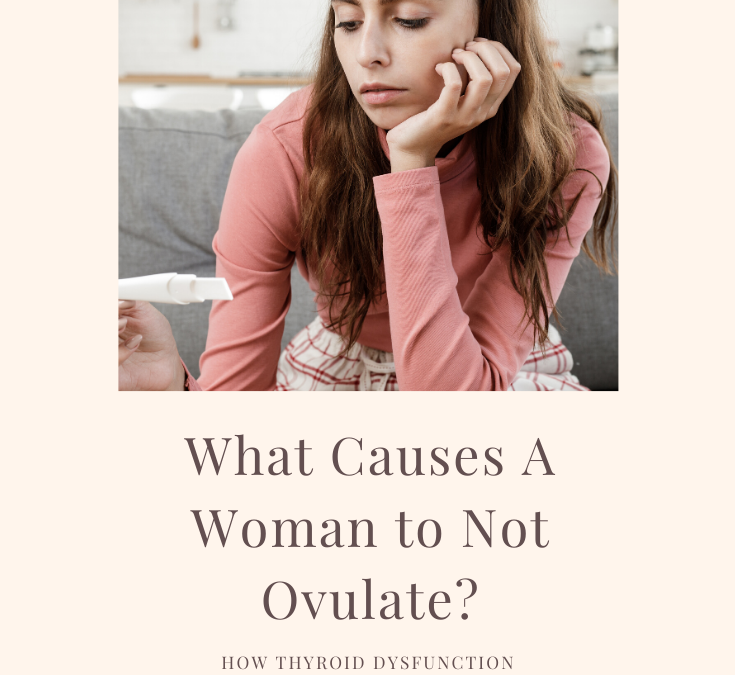Did you know that thyroid dysfunction can affect your reproductive health? Well, I for sure didn’t realize that it did. As I was researching for this particular series What Might Cause A Woman to Not Ovulate I kept coming across information discussing how hyperthyroidism and hypothyroidism can impact your fertility. Specifically, how it causes ovulation dysfunction and menstrual irregularities. This caught my eye and I had to learn more. And indeed the thyroid has a big impact on reproductive and menstrual health. Here’s how.
Page Contents
The Role of the Thyroid
First, let’s talk about what the thyroid is and the role of the thyroid in the body. The thyroid is a small, butterfly-shaped gland that lives in the front of your throat. It’s responsible for regulating the body’s metabolism and bodily functions such as:
- Heart and digestive function
- Muscle Control
- Brain development
- Mood and bone maintenance
In order for the thyroid to perform its duties properly, it needs the help of a key nutrient known as iodine. Iodine is important for thyroid function because it helps the gland produce thyroid hormones. As a result, thyroid hormones thyroxine (T4), triiodothyronine (T3), and calcitonin are produced. Consequently, T3 and T4 are responsible for many of the metabolic functions in the body. Whereas calcitonin is focused on calcium and bone metabolism.
Once, thyroid hormones are created, they are ready to be released into the bloodstream. Yet, the thyroid doesn’t act alone in this process. As a matter of fact, it takes instructions from the pituitary gland; which lets the thyroid know exactly how much or how little hormones it needs to release.
When Thyroid Impacts Ovulation
Now, we have a pretty good idea of what the thyroid is and how it functions under normal, healthy conditions. Let’s talk about what happens when there’s an imbalance. When the thyroid isn’t able to secrete the appropriate amount of hormones it leads to dysfunction within the body. Consequently, these imbalances not only disrupt metabolic function but menstrual and reproductive function as well. And, this is when thyroid issues begin to disrupt ovulation and cause menstrual irregularities. The two thyroid conditions that I want to talk with you about today in regards to ovulation dysfunction are hyperthyroidism (overactive thyroid) and hypothyroidism (underactive thyroid).
Hyperthyroidism (overactive thyroid)
This occurs when your thyroid gland produces excess thyroxine hormone (T4). Consequently, too much of this hormone can lead to infrequent or absent periods. The primary reason for this is an overproduction of the sex hormone-binding globulin (SHBG). When this occurs no egg is released from the ovary. Therefore, ovulation is inhibited. Over a period of time, this can have a serious impact on fertility and wreak havoc on your menstrual health in general.
You may experience issues with irregular menstrual cycles/periods which is caused by the body failing to release an egg (anovulation). This can manifest itself in a couple of different ways. First off, you may have prolonged cycles that last beyond the average 25-32 cycle day range. Meaning you’re not having a period each month due to your body not ovulating as it should. On the other hand, you may have abnormally long cycles in which you fail to ovulate but still experience a monthly bleed. Charting your fertility and tracking your symptoms can provide helpful feedback for what’s happening in your body each month. Additionally, this information can be shared with your medical professional and be used to help pinpoint if this is due to an overactive thyroid or not. Working with a specialist that can teach you how to chart your fertility using the symptothermal method is beneficial.
Hypothyroidism (underactive thyroid)
Having an underactive thyroid means your body isn’t making enough thyroid hormones. This leads to low levels of thyroxine (T4) or elevated levels of the thyroid-releasing hormone (TSH). In turn, this causes the body to increase prolactin production. Therefore, creating a surplus of prolactin within the body. Prolactin is a hormone that’s responsible for stimulating milk production post-childbirth. High levels of this hormone can prevent ovulation (anovulation) or lead to irregular ovulation (oligo-ovulation). Either way, this decreases your fertility and causes irregular cycles/periods.
In addition to ovulation dysfunction and menstrual irregularities, an underactive thyroid can also impact your luteal phase. You may find that you have a shorter than average luteal phase. On average the luteal phase should last between 12-14 days. But, since all bodies are unique and different some women may have an 11-day luteal phase while others may have a 17-day one. As long as you fall within the spectrum of 11-17 days your luteal phase is considered healthy. Whereas having a luteal phase that’s l10 days or less is unhealthy and can interfere with egg implantation. Once again charting your fertility and tracking symptoms can prove helpful when it comes to discussing with your medical professional if an underactive thyroid is causing these issues for you.
Symptoms of An Overactive Thyroid
Signs and symptoms that can indicate you may have an issue with an overactive thyroid include but are not limited to:
- Abnormal weight loss
- Increased appetite
- Sensitivity to heat
- Sweating
- Rapid heartbeat
- Irregular heartbeat
- Fatigue and muscle weakness
- Skin thinning
- Frequent bowel movements
- Irregular menstrual cycles
- Irregular periods
If you’re experiencing these symptoms take note of them and schedule an appointment with your primary care physician.
Symptoms of An Underactive Thyroid
Signs and symptoms that indicate an underactive thyroid include but are not limited to:
- Fatigue and muscle weakness
- Depression
- Constipation
- Feeling cold
- Decreased sweating
- Elevated blood cholesterol
- Slowed heart rate
- Dry skin
- Weight gain
- Irregular menstrual cycles
- Irregular menstrual periods
Again, if you find these symptoms are common for you it’s important that you track them and schedule an appointment with your doctor for testing.
Discussing Your Symptoms with Your Doctor
If you suspect you have a thyroid issue you will definitely want to schedule an appointment with your doctor. Receiving an evaluation complete with blood work is the only way to properly test for thyroid and determine if you have an issue.
What You Should Talk About During Your Appointment
Typically, when I would go visit the doctor in the past I would rely on them to “figure out” what was wrong with me. I wasn’t very proactive when it came to my health. As a matter of fact, I was kinda intimidated by my doctor. I’ll admit I had a little “white lab coat” anxiety. I felt that they had the power and I had none and wasn’t allowed to speak up on my behalf or actually participate in the appointment.
Nevertheless, I’ve learned it’s so much better when you take an active role in your health and well-being. Providing as much information as possible can be helpful to your doctor and may actually show that you’re serious about finding a solution. Some key facts that you want to make sure you share with your doctor include:
- Your complete health history (including hereditary and genetic risk)
- Menstrual health and reproductive health (pregnancy, miscarriage, periods, etc)
- Share a timeline of when you began to notice symptoms
In addition to these key topics, you also want to make sure that you’re asking open-ended questions during your appointment. Do you have questions regarding the testing procedures? Perhaps you want to learn more about what treatments are available to help manage thyroid dysfunction. Learning more about how the thyroid impacts fertility and reproductive health can help you make informed decisions regarding your fertility. The more you advocate for your health the better your chances are at getting answers and finding a doctor that wants to help you get better.
Tests Your Doctor May Recommend
You can expect to have a physical examination and in-depth discussion with your doctor to help identify issues and determine what the problem is. It is at this point that your doctor will decide which tests to order. Typically, you will have a thyroid panel that tests your body’s thyroid-stimulating hormone level (TSH), Free T4 (thyroxine), and Free T3/Total T3 (triiodothyronine). Your doctor should discuss your results with you in-depth in a follow-up appointment so that a plan of action can be implemented. Whether that is moving towards getting treatment or additional testing.
What Might Cause A Woman to Not Ovulate
There are multiple underlying conditions that can interfere with ovulation and lead to menstrual irregularities. And, having a thyroid imbalance is just one of many. I’m anxious to learn more about these different conditions and share them here in this blog series. If you missed part one of this series Are You Struggling with Irregular Periods. Follow the link and give it a read. I share how polycystic ovary syndrome, another common underlying condition, affects ovulation. As always, feel free to share your experiences or ask questions below.
References.
(1). Everyday Health: Thyroid Issues and Fertility: What to Know, by Diana Rodrigues, medically reviewed by Lindsey Marcellin MD, MPH
(2). Healthline: Everything You Need to Know About Hypothyroidism; written by Kimberly Holland, medically reviewed by Judith Marcin, MD April 3, 2017
(3). Very Well Health: How Thyroid Function Affects Menstruation; written by Mary Shannon updated September 20, 1019, medically reviewed by Anita Sadaty October 22, 2018
(4). How Does the Thyroid Gland Work?






